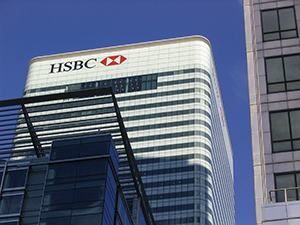HSBC caps Q1 as ECB QE reboots AT1
HSBC provided a late highlight to first quarter Additional Tier 1 activity with a $2.25bn transaction in late March that rounded off a constructive first quarter in which issuers across the credit spectrum were able to find takers for their capital instruments on the back of bullish credit markets.
The UK bank on 23 March sold its perpetual non-call 10 high trigger, equity conversion securities at 6.375% on the back of some $14bn of demand, with a $2bn AT1 debut for Standard Chartered later the same week confirming the healthy state of the market with a similarly sized book.
The transactions were an encouraging and rapid comeback from a lacklustre DNB $750m AT1 debut the previous week that had attracted a modest $2bn of demand, with levels off highs enjoyed by its Nordic peers earlier in the quarter.
“There are numerous risk factors to credit spreads which have largely been discounted so far this year: Russia, the Middle East, oil price volatility and Grexit,” said a market participant. “However, AT1 and Tier 2 markets are susceptible to corrections.”
Market participants meanwhile noted that HSBC erred on the side of caution in pricing its AT1: one said that initial price thoughts of the 6.625% area or the investment grade instrument had offered a new issue premium of more than 60bp.
“Unsurprisingly, the bonds immediately traded up a full 1.5 points off the break,” he added.
Pricing levels approached a peak in mid-February when Svenska Handelsbanken was able to price a $1.2bn perpetual non-call six AT1 debut at a record coupon low of 5.25% on the back of $4.7bn of demand, with its Swedish peers enjoying similar levels in the first quarter. (See Nordic feature for more.)
Rabobank had gotten the asset class off to a solid start on 15 January with the first Dutch AT1, a Eu1.5bn 5.5% perpetual non-call 5.5 issue launched after the tax treatment of the instruments in the Netherlands was set out late in 2014. Following IPTs of the 5.625% area, pricing was set at 5.5% on the back of a Eu4bn book.
The accommodating tone of the market was demonstrated by Banco Popular Español finally getting away a long-planned and previously-postponed AT1 transaction, albeit in a club-style deal. The Spanish bank sold its unrated Eu750m perpetual non-call five issue at a coupon of 8.25% on 4 February.
Market participants attributed the much-improved sentiment in the AT1 market to wider market considerations, notably the European Central Bank finally on 22 January confirming its plans for full-scale quantitative easing. Its Expanded Asset Purchase Programme helped lift issuance across asset classes to record levels at the same time as credit markets rallied.
“Globally speaking, I’d say that we still feel reasonably constructive on the subordinated debt markets, both for fundamentals and valuations reasons,” said François Lavier, portfolio manager and analyst at Lazard Frères Gestion. “I’d add that thanks to the recent ECB asset purchase programme more and more investors are looking to the asset class, which is very encouraging from a technical perspective.”
The environment of apparently ever lower rates has meanwhile on the supply side made all-in yields more attractive for issuers.
However, despite recovering from a mixed second half of 2014, the market remains off its highs of earlier last year, according to Vincent Hoarau, head of FIG syndicate at Crédit Agricole CIB.
“Valuations in AT1s have recovered massively since volatility decreased and the Greece situation declined in relevance in Q1,” he said. “The frenzy observed during the same period of 2014 has nevertheless gone, perhaps forever – who would have thought that the long-awaited inaugural Rabobank AT1 would get ‘only’ Eu4bn of orders?
“In primary, we are far from the average book sizes of 2014 as order inflation has disappeared and since many opportunistic buyers exited the asset class. That said, AT1 is being entertained by more and more dedicated players, suggesting that the asset class may have found a home.”

